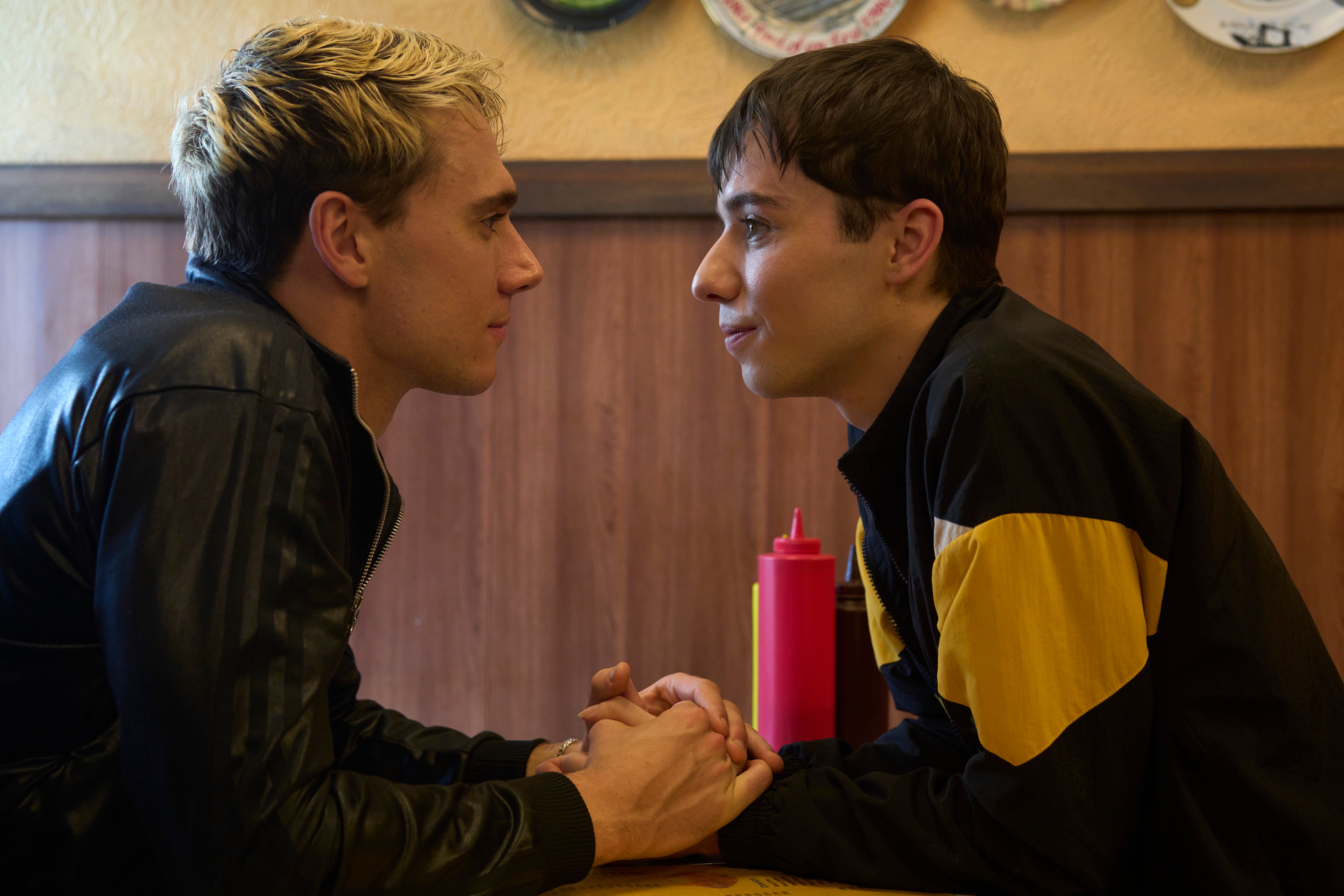
It’s hard to be a kid. You might not have to stare down the taxman, might not need to know how to parallel park or julienne a bell pepper, but the experience of being a half-formed thing is far trickier. This is the moment where BBC Three’s new eight-part drama What It Feels Like for a Girl – a story both universal and also rooted in the transgender experience – picks up. The messy, uncertain, self-destructive, poignant life of a teenager.
Ellis Howard is Byron, a 15-year-old boy growing up in the Nottinghamshire town of Hucknall, part of a disrupted, explosive family, and dealing with life’s small questions, like their sexuality and gender. “I’m not a lad,” they tell an ice cream vendor, much to the frustration of dad Steve (Michael Socha), who has always dreamed of being a father to a football-loving little boy. Only Byron’s grandma – played by Adolescence’s Hannah Walters – seems accepting. In this identity whirlwind, Byron discovers the appetites of grown men for a schoolchild, dispensing favours in the town’s public “bogs” in exchange for crumpled five-pound notes. Gradually, this entry into sex work becomes something bigger, pushing Byron away from their old friends and family, and into the hands of violent pimp Liam (Jake Dunn).
This is the Midlands of the millennium. “Kernkraft 400” by Zombie Nation plays in sweaty nightclubs, kids frequent MSN chat rooms or play Snake on Nokia 3310s, schools are governed by the coolest fits on home clothes day. In this milieu, Byron finds the “Fallen Divas”, including empathetic mentor Lady Die (Laquarn Lewis) and glamorous troublemaker Sasha (Hannah Jones). “We’re used to waifs and strays,” they tell Byron, who, within their orbit, quickly becomes tamed (often wearing a collar and leash). This constitutes the happy part of Byron’s life – then there’s the prostitution, the drugs, the violence. It all leads, inexorably, to a single terrible, coerced decision. Acceptance, finding your tribe, comes with a price.
When writer Paris Lees came to prominence in the early 2010s, she was riding a wave of positivity about trans inclusion in the LGBT+ movement. She topped The Independent’s 2013 Pink List after becoming the first trans woman to present on BBC Radio 1. She would later become Vogue’s first trans columnist. Yet by the time she released her 2021 novel – from which this show is, loosely, extracted – the public mood had changed, and her obsessive critics had taken the political conch. Perhaps that’s why this show is squirrelled away on BBC Three or why the BBC’s own announcement press release doesn’t use the word “trans”, except once, when quoting Lees. Is this a memoir that will be lost in the fog of the culture wars?
After all, What It Feels Like for a Girl is not a portrait of a successful childhood. Byron evolves quickly from vulnerable youth to the perpetrator of cruelty and selfishness. “You’re being horrible,” mum Lisa (Laura Haddock) says, over some birthday champagne. “Bingo,” they reply. The rivalry with Sasha, too, paints them both in a bad light, trading needless barbs while the Fallen Divas watch on. Contrary to what Lees’s critics – who are inordinately focused on an eight-month jail term she served for a robbery committed when she was 16 – say, this is a reflective, self-critical story. It is not a coming-of-age tale that moves linearly towards success and validation, nor a classic three-act bildungsroman. Instead, it presents morality as something murky and fluid, just like sexuality and gender, and equally in thrall to the fickle whims of the heart.
What Lees understands, instinctively, is the power of confessional journalism. Paired here with an impressive roster of new acting talent – led by a brilliant Howard, who portrays Byron from adolescence through to coming out as a trans woman – What It Feels Like for a Girl is evocative of the edgy BBC Three series that millennials grew up on, shows like Conviction and Lip Service. It shares something of their aesthetic too – a reliance on brassy music, fast edits, and hammy narration – that might make some viewers cringe. Lead director Brian Welsh throws a lot of visual motifs – montaged archive footage, dream states and hallucinations – at the show, with mixed success. It is at its best when rawer – more like something that might’ve been shown in a primetime slot, on BBC One.

But at a time when the trans community are being forced to suffer almost daily indignities at the hands of Britain’s political and media establishment, the presence of What It Feels Like for a Girl feels urgent. “You’ll be alright,” Byron’s grandma says. “You’re too clever not to be.” But survival is not inevitable. It happens against the odds. And in a world where it is easy to feel pessimistic about the course of progress, What It Feels Like for a Girl presents an engaging – and rational – case for optimism.




